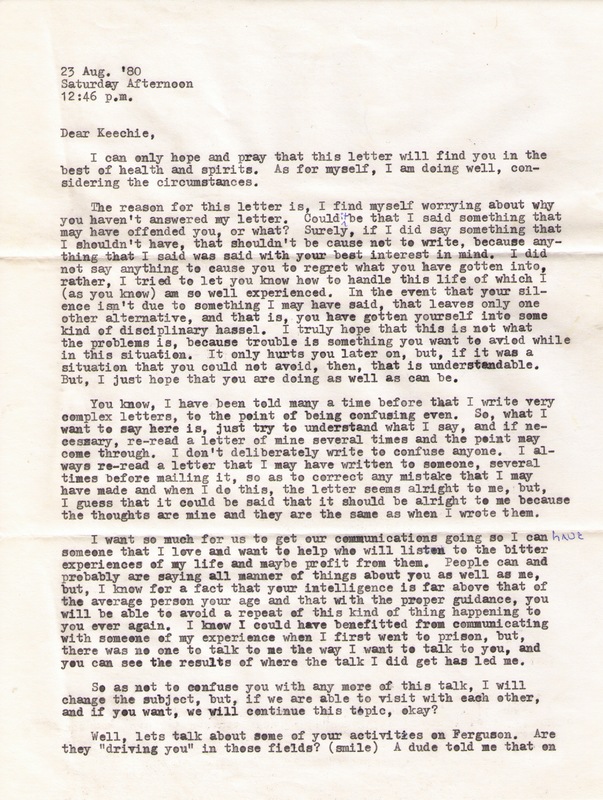The Case of Charlie Brooks Jr. through the Lens of Articles Three and Ten
"Everyone has the right to life, liberty and security of person." Article 3, Universal Declaration of Human Rights
"Everyone is entitled in full equality to a fair and public hearing by an independent and impartial tribunal, in the determination of his rights and obligations and of any criminal charge against him." Article 10, Universal Declaration of Human Rights
In this letter, Charlie Brooks Jr. writes to his son Keith discussing a potential visit in prison. Keith was also in prison at the time, but located at a different facility in Texas. Charlie explains how to go about the visit request form, as well as the logistics if the visit was granted. One of the reasons Charlie was so knowledgeable about this topic, as well as other legal matters, was that “when he was incarcerated, he took law courses, and he graduated, and he was a paralegal…a jailhouse lawyer (Derrek Brooks interview 10:20). When a person is put in prison, they, indeed, lose many of their rights, however, not all are taken away. According to Article Three of the United Declaration of Human Rights (UDHR), “everyone has the right to life, liberty and security of person.” In other words, although Charlie Brooks Jr. was incarcerated, he retained his right to get an education and a job. In addition, Charlie’s rights as an inmate also included being able to see his son, regardless that both him and Keith were inmates in separate prisons. Under the law, inmates are allowed to visit one another if an Inmate Request to Official form is approved. In the majority of circumstances, usually a person who is not incarcerated goes to visit a person who is, however prisoners have this right as well, if granted. This further shows that even though prison does strip inmates of various rights, the UDHR recognizes these inmates are still human, and are subject to rights.
This next letter is a follow up from Charlie Brooks Jr. to his son Keith in regards to why he has not answered yet. Charlie is concerned about his son, and asks if the reason he has not responded is because he is mad about the advice he gave him, or if he got into trouble with the officers, which would prevent him from responding. Again, Charlie mentions the visit he discussed in the previous letter, and how he still would love to see Keith.
The interview with Derrek Brooks regarding his father, Charlie Brooks Jr., helped me understand the primary sources I analyzed to a greater extent. Derrek Brooks discussed his father’s early life prior to his arrest, as well as his life in prison until his death in 1982. He also explains how his father and another man were both convicted of the same murder, however the other man was not executed and is still alive today. Two interesting statements that stood out throughout the interview were 1) no witnesses were interviewed and 2) no DNA test was conducted. According to Derrek, “my father was not inside the room…and we have witnesses at the time of his trial that verified that. However, the prosecutor, or defense attorney, never interviewed anybody to prove he was not in there” (Derrek Brooks interview 4:01). Article Ten of the UDHR proclaims that everyone has the right to a fair trial, yet the fact that no witnesses were interviewed does not seem fair in my eyes. The other man Charlie was with at the time of the murder, Woody, was granted another trial even though witnesses were not interviewed for him as well. Two men convicted of the same crime, yet one of them gets another chance while the other is executed seems to go against what the UDHR states. Additionally, during the 1970s and early 1980s, DNA profiling had not yet been developed. Derrek has hopes of exonerating his father’s name, and believes he could do this with a DNA test. The UDHR grants Derrek the right to ask for a DNA test to be performed under both Articles Three and Ten. Although it would not bring Charlie back to life, if proven innocent, Derrek and his family would finally have the closure they have been wanting for decades.
Overall, themes from the United Declaration of Human Rights are present throughout the primary sources and oral histories of Charlie Brooks Jr’s. case. I now understand that although the UDHR clearly states certain rights, people may not always be able to utilize them. On the other hand, I’ve learned that some rights are more protected than others, being granted to people when you would least expect it. Moving forward, I hope that the UDHR is discussed and applied more to situations around the world.
https://tinyurl.com/mkh4dob - Derrek Brooks Interview with TAVP
By Alex Cantwell


